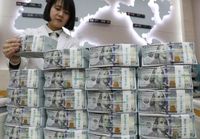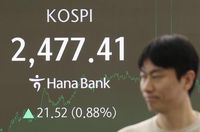SEOUL, April 15 (Yonhap) -- South Korean stocks closed higher for the second consecutive session on Tuesday, buoyed by optimism following gains on Wall Street and eased concerns over U.S. President Donald Trump's tariff measures. The benchmark Korea Composite Stock Price Index (KOSPI) rose by 21.52 points, or 0.88 percent, ending the day at 2,477.41.
Trading volume was moderate, with 550.7 million shares changing hands, valued at approximately 6.4 trillion won (US$4.49 billion). In a positive sign for the market, the number of advancing stocks significantly outnumbered those that declined, with 707 winners compared to 179 losers.
Institutional investors were active buyers, purchasing a net 182.8 billion won worth of stocks, while retail and foreign investors together sold a net 266.6 billion won. This mixed activity reflects a cautious but optimistic investor sentiment in the face of ongoing trade discussions.
Overnight, U.S. markets also posted gains, driven by President Trump’s announcement of an exemption from reciprocal tariffs for smartphones, computers, and other electronics. On Monday, April 14, 2025, Trump also suggested a potential pause on tariffs related to auto parts, allowing global suppliers more time to adjust their production strategies to the United States.
“Trump's indication of a short-term pause of tariffs on auto parts could serve as a temporary positive catalyst,” noted Han Ji-young, an analyst at Kiwoom Securities. This sentiment was echoed in the performance of U.S. indices, with the S&P 500 rising by 0.79 percent, the Dow Jones Industrial Average climbing 0.78 percent, and the tech-heavy Nasdaq composite increasing by 0.64 percent.
In the South Korean market, shares in the semiconductor and automotive sectors led the gains. Market heavyweight Samsung Electronics saw its stock rise by 0.71 percent, closing at 56,600 won, while rival SK Hynix gained 0.22 percent, ending the day at 180,600 won. The automotive sector also performed well, with Hyundai Motor jumping 4.29 percent to 187,000 won and Kia increasing by 3.37 percent to 85,800 won.
Financial and internet portal stocks also advanced, with KB Financial rising by 2.5 percent to 78,000 won and Naver, the leading portal operator, climbing 0.66 percent to 183,900 won.
Meanwhile, the South Korean won traded at 1,425.5 against the U.S. dollar at 3:30 p.m., a decrease of 1.4 won from the previous session. This slight dip in the won's value reflects the ongoing complexities of the global trade environment.
Bond prices, which typically move inversely to yields, rose as well. The yield on three-year government bonds fell by 0.9 basis points to 2.399 percent, while the return on the benchmark five-year government bonds dropped by 1 basis point to 2.499 percent.
This positive trend in the stock market follows a nearly 1 percent increase on Monday, April 14, where the KOSPI gained 23.17 points, or 0.95 percent, closing at 2,455.89. On that day, trading volume was slightly lower at 474.1 million shares, valued at 6.56 trillion won (US$4.61 billion). Retail investors were particularly active, buying a net 192.6 billion won worth of stocks, while foreign investors and institutions combined sold a net 264.8 billion won.
Samsung Electronics also performed well on Monday, jumping 1.81 percent to 56,200 won, alongside LG Energy Solution, which climbed 2.24 percent to 343,000 won. Hyundai Motor added 1.01 percent to close at 179,300 won, and Hanwha Aerospace rose by 1.67 percent to end at 792,000 won.
Additionally, shipbuilders enjoyed brisk trading, with HD Hyundai Heavy Industries gaining 1.46 percent to close at 347,500 won and Hanwha Ocean jumping 3.22 percent to 80,100 won.
As the trading day concluded, the local currency reflected a strong performance earlier in the week, trading at 1,424.1 won against the dollar on April 14, reaching its highest value since December 6, 2024. The yield on three-year Treasurys also fell by 0.3 basis points to 2.408 percent, while the benchmark five-year government bonds dropped by 0.1 basis points to 2.509 percent.
Looking ahead, market analysts will continue to monitor the developments in U.S. trade policy, particularly any further announcements from President Trump regarding tariffs, as these factors will undoubtedly influence investor sentiment and market performance in the coming days.





